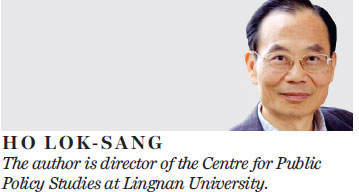Rule of law is better than the 'rule of man'
Updated: 2015-01-27 09:41
By Ho Lok-Sang(HK Edition)
|
|||||||
Arecent speech by Senior Counsel Paul Shieh, former chairman of the Hong Kong Bar Association, was much praised by commentators. His remarks on the differences between the rule of law and "rule of man" are important.
The rule of law certainly does not mean that the executive branch of the government is above the law and can use the law for its own purposes other than the public interest. Shieh says there is no universally accepted definition of the rule of law. But I believe the dictum that no one can be above the law and that accepted standards and processes must be followed is central to the concept of the rule of law. This means the Chief Executive (CE), whoever he or she is, must be bound by the law and is not free to do as he or she likes. Thus, the statement, often repeated by the CE, that the SAR government will govern according to the law should be welcomed by anyone who genuinely believes in the rule of law. But I would be appalled if the CE said he would govern Hong Kong according to the popular will or according to his own beliefs.
Shieh is right in saying that obeying the law is not everything there is to the rule of law. I recall that Benny Tai, one of the three organizers of the "Occupy Central" movement, repeatedly said obeying the law was a "low level" interpretation of the rule of law. Tai has justified the "Occupy" campaign as an act of "civil disobedience". Civil disobedience, according to Senior Counsel Jat Sew-tong, former chairman of the Independent Police Complaints Council, is a fine tradition which does not undermine the rule of law. All these comments imply there is something more important than obeying the law.
The law, like democracy, is an instrument serving the public interest. We uphold the law and pursue democracy only as long as the law and democracy serve the public interest. If a law is seriously flawed and really undermines the public interest, a case can be made for disobeying the law. This would not deviate from the spirit of the rule of law. However, who is to judge if a law deviates from the public interest? In an article last year I argued that not all civil disobedience campaigns were justified. This is because the organizers of such campaigns can be too presumptuous in asserting that a law deviates from the public interest. Even if a law is flawed, in a civilized society abiding by the rule of law, there are still legal ways to amend it. The US Constitution, for example, has been amended 27 times since its adoption in 1789. The 19th Amendment was as late as 1920 - when it extended voting rights to women for the first time. Using illegal ways to push an amendment to the law can only be justified if the benefits justify the social costs involved.
Shieh is right in reiterating the importance of judicial independence and respect for basic human rights and liberty. Without these values, there is a risk that some people may be victimized by the arbitrary use of power. The rule of law is there to prevent people abusing power to jeopardize the basic rights of others. One major reason I opposed "Occupy" was that it arbitrarily deprived citizens of their freedom of movement. I regarded this to be a gross abuse of power. Just as I don't like seeing officials abuse their powers and trample on the legal rights of others, neither do I like to see citizens doing this. However, the occupiers kept saying they did what they did on behalf of all Hong Kong people and for future generations. Such a presumptuous argument is exactly what the "rule of man" means.
It is a mystery to me why Shieh is unhappy with seeing "the government said that elections to the legislature had been held according to the law, police had arrested suspects according to law, the government governs Hong Kong according to law, policies are formulated and implemented according to law. Everything is done according to law."
I agree with him that there is more to the rule of law than simply obeying the law. But I am happy to see that elections, arrests and policy formulation are all done according to the law.
Most importantly, Hong Kong's courts remain independent. Indeed the State Council's white paper, to which Shieh refers in his speech, explicitly reiterates the independence of Hong Kong's judiciary. I am not surprised when politicians mislead the public by saying the white paper undermines judicial independence. This is because politicians have their own agendas to promote. But Shieh was the chairman of the Bar Association. So why he said this is a mystery to me.

(HK Edition 01/27/2015 page10)